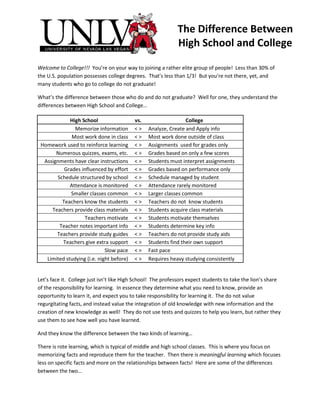
Unlv Welcome To College
- 1. The Difference Between High School and College Welcome to College!!! You’re on your way to joining a rather elite group of people! Less than 30% of the U.S. population possesses college degrees. That’s less than 1/3! But you’re not there, yet, and many students who go to college do not graduate! What’s the difference between those who do and do not graduate? Well for one, they understand the differences between High School and College… High School vs. College Memorize information <> Analyze, Create and Apply info Most work done in class <> Most work done outside of class Homework used to reinforce learning <> Assignments used for grades only Numerous quizzes, exams, etc. <> Grades based on only a few scores Assignments have clear instructions <> Students must interpret assignments Grades influenced by effort <> Grades based on performance only Schedule structured by school <> Schedule managed by student Attendance is monitored <> Attendance rarely monitored Smaller classes common <> Larger classes common Teachers know the students <> Teachers do not know students Teachers provide class materials <> Students acquire class materials Teachers motivate <> Students motivate themselves Teacher notes important info <> Students determine key info Teachers provide study guides <> Teachers do not provide study aids Teachers give extra support <> Students find their own support Slow pace <> Fast pace Limited studying (i.e. night before) <> Requires heavy studying consistently Let’s face it. College just isn’t like High School! The professors expect students to take the lion’s share of the responsibility for learning. In essence they determine what you need to know, provide an opportunity to learn it, and expect you to take responsibility for learning it. The do not value regurgitating facts, and instead value the integration of old knowledge with new information and the creation of new knowledge as well! They do not use tests and quizzes to help you learn, but rather they use them to see how well you have learned. And they know the difference between the two kinds of learning… There is rote learning, which is typical of middle and high school classes. This is where you focus on memorizing facts and reproduce them for the teacher. Then there is meaningful learning which focuses less on specific facts and more on the relationships between facts! Here are some of the differences between the two…
- 2. Rote Learning vs. Meaningful Learning Memorization <> Understanding and integration Focus on discreet facts <> Focus on relationships between facts Homework used to reinforce learning <> Assignments used for grades only Repitition most common strategy <> Must use a variety of strategies Can remember for short periods <> Can remember for long periods Cannot transfer info to new contexts <> Easily transfer info to new contexts Requires little time and effort <> Requires more time and effort Often taught in school <> Rarely taught in school Requires no other skills or knowledge <> Enhanced by other skills and knowledge Often boring <> Often stimulating Involves low level cognitive skills <> Involves higher order cognitive skills Output = reproduction <> Output = analysis, synthesis, creation Limited benefit to test taking <> Very flexible in studying for tests Suited for lower level education <> Suited for higher levels of education What does this mean for you? Well, it means that you are responsible for your own learning and you will likely need to change the way you approach studying and learning! You can’t expect the teacher to tell you what you need to know or provide study guides that basically tell you everything you need to know for a test. You can’t expect to earn good grades by only studying for a couple of hours right before a test! And you can’t expect teachers to motivate you or help you manage your schedule. You have to do these on your own! What do you need to do to succeed? 1. Learn how to learn! – Metacognitive skills and study skills can help you raise C’s to A’s! 2. Set goals and stay organized – Set goals and stay focused on them as you manage your time! 3. Take care of yourself! – Learn how you can manage your stress effectively!